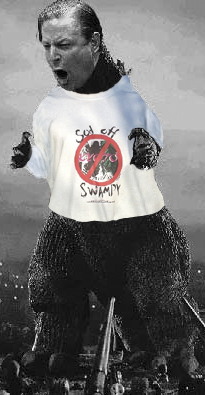“Contradictions Within the People”
There seems to be some amplification of the views noted in my post last week.
China is preparing to “strike hard” against rising public unrest, a senior police official said according to state media on Thursday, highlighting the government’s fears for stability even as the economy booms.
An unnamed top official of China’s Ministry of Public Security told a Wednesday meeting that China faced a long period of dangerous social discontent, Xinhua news agency said.
I could say “Go, Google, GO! Feed that fire, baby!”, but won’t. It’s one thing when something the size of Poland or Ukraine implodes and a democracy emerges. Quite a different plate of Mu Shu when it’s BILLIONS of unhappy campers. It also seems as if they’re ‘setting the stage/laying the groundwork’ for another repressive round of democracy dream squashing, by lining up a familiar bad-guy in advance.
He also said that “terrorism is a real threat against our country” and urged officers to guard against attacks.
China says that its biggest terrorist threat comes from Xinjiang, the far western region dominated by the largely Muslim Uighur people who share a language and culture similar to Central Asian countries.
So I’m betting that, if there’s another (Or TEN THOUSAND more) Tiananmen(s), the government line ~ as they mercilessly crush all dissension ~ will be that it’s all Islamofascists at work. Muslim terrorists vice average Chinese citizens throwing off the yoke of tyranny.
But they’ll sure all look like Chinese college students, factory workers and peasants if we get to see any footage. IF.
But time’s a’ wastin’, boys. How long ’til the Olympics in Beijing?

“Quite a different plate of Mu Shu when it’s BILLIONS of unhappy campers.”
I’m not quite sure I agree. I look to see another period of provincial autonomy. That last time this happened it was called the Warlord Era, but it’s happened before: Chinese history is largely cyclical, which led to their mystical and cyclical view of time.
A free and independent Canton would dwarf the economies of the other provinces (save perhaps Shandong), and shift power southwards, away from the Commie stronghold around Beijing. Tibet might even regian tis independence. All in all, I don’t see civil war writ large, I see lots of smal skirmishes at provinical borders, and shifting alliances between warlords.
The big problem might be that the Hui and Uighur populations might get infiltrated by fundamentalists.
The Han aren’t the only ethnic group in China, over time they’ve done a pretty good job of eliminating all the others – makes me wonder about their genetic drift and the duration required for building-in insanity, hemophilia, and other genetic disorders.
Given the population size I wouldn’t worry that too much.
Not true Mr. B. – the big population means lots of kids from nearly incestuous relationships. And most Chinese stay in their villages, meaning with time there are only one or two families in each locale.
Before the war, my FIL says that his village in Shandong all had the same last name – cousins were encouraged to marry one another so that property would remain in the family. When we pressed him about this, he did admit that a few uncles were funny in the head (this was back in the 20s and 30s). Hopefully all the upheaval in the war helped shake things up a bit, genetically speaking. For example, my FIL had two kids with his first wife, who was also his second cousin, but he went on to father nine or ten more by two other (totally unrelated) wives in Taiwan.
Ah, you know I guess that’s true. Without a lot of freedom for internal movement there would be all these isolated gene pools.
1936—>1945
1980—>1989
Now, that’s probably just a coincidence, and I’m sure the ChiComs think so, but…let’s see what happens in China nine years after the Olympics.